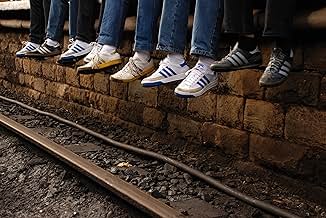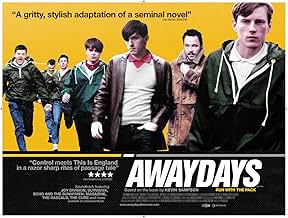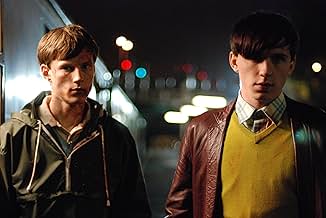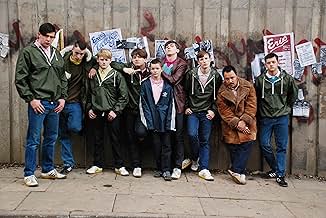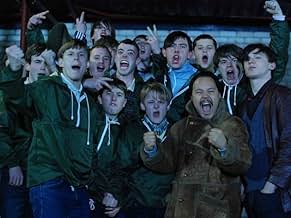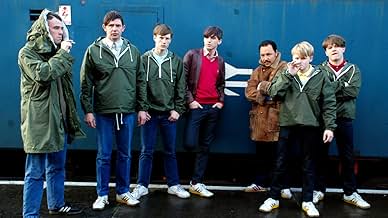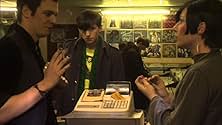AVALIAÇÃO DA IMDb
5,7/10
3,9 mil
SUA AVALIAÇÃO
Adicionar um enredo no seu idiomaIn the grim early years of Margaret Thatcher's premiership, also the crown years of hooliganism, the opportunities for thrill-seeking young men are what they've always been: sex, drugs, rock... Ler tudoIn the grim early years of Margaret Thatcher's premiership, also the crown years of hooliganism, the opportunities for thrill-seeking young men are what they've always been: sex, drugs, rock n' roll, fashion, football and fighting.In the grim early years of Margaret Thatcher's premiership, also the crown years of hooliganism, the opportunities for thrill-seeking young men are what they've always been: sex, drugs, rock n' roll, fashion, football and fighting.
- Prêmios
- 1 vitória no total
Michael Ryan
- Marty
- (as Micheal Ryan)
Anthony Borrows
- Pee Wee
- (as Anthony Burrows)
Holliday Grainger
- Molly
- (as Holliday Granger)
Lianne Sorsa
- Suzy
- (as Lianna Sorza)
Dannielle Malone
- Janie
- (as Danielle Malone)
Avaliações em destaque
Awaydays is a very misunderstood film in some respects. Had it been made in a time when we weren't already saturated with "football hooligan" films I genuinely believe it would've been much better received. Like Alan Clarke's 1988 "The Firm" which also uses football violence as a backdrop, Awaydays is much deeper than the likes of Football Factory. It's a story about two young lads both in that gap between being at school and entering the grown up real world if you like.
The two main characters are (I'm guessing) aged about 19 and both have dreams but neither has direction. What they have in common is they both want one another's life. It's almost tragic, because neither is going anywhere really.
After initially forming a close bond (and it's suggested that Elvis has romantic feelings towards Carty) their friendship soon starts to fall apart when the underlying reality that they are nothing alike surfaces. Neither are particularly likeable character's albeit in different ways. Elvis is probably the worse of the pair but has a very likeable side to him, he's the cool one of The Pack if you like, and the hooligan side of him is only one of a few personalities he seems to live.
Awaydays is gritty, and it's northern setting fits the story perfectly. I've read a lot of other reviews commenting on how fake the scouse accents are, but the film isn't set in Liverpool it's set on the Wirral, Birkenhead to be exact and I suppose given it's location it is a little like a Liverpool accent but slightly off if that makes sense?
Anyway, if you're expecting a football hooligan film you could be sorely disappointed. If you want to watch a decent coming of age drama with a great story I would highly recommend Awaydays.
The two main characters are (I'm guessing) aged about 19 and both have dreams but neither has direction. What they have in common is they both want one another's life. It's almost tragic, because neither is going anywhere really.
After initially forming a close bond (and it's suggested that Elvis has romantic feelings towards Carty) their friendship soon starts to fall apart when the underlying reality that they are nothing alike surfaces. Neither are particularly likeable character's albeit in different ways. Elvis is probably the worse of the pair but has a very likeable side to him, he's the cool one of The Pack if you like, and the hooligan side of him is only one of a few personalities he seems to live.
Awaydays is gritty, and it's northern setting fits the story perfectly. I've read a lot of other reviews commenting on how fake the scouse accents are, but the film isn't set in Liverpool it's set on the Wirral, Birkenhead to be exact and I suppose given it's location it is a little like a Liverpool accent but slightly off if that makes sense?
Anyway, if you're expecting a football hooligan film you could be sorely disappointed. If you want to watch a decent coming of age drama with a great story I would highly recommend Awaydays.
There seems to be some ill-will towards this tidy little parable and I cannot understand why.
Maybe the Joy Division fanboys feel the material is misplaced but I contend the great soundtrack is only used to set time and place and does not work in reverse like some latter day music vid.
Nor is it a 'hooligan' movie.
My own reaction was that this is a terrific effort, both from a committed cast and production side who nail the period in perfect British bleakness.
The football hooliganism feels like it is intended - a fantastical sideshow and not the main thrust of the film which centres around a lower middle-class lad's attempt for acceptance by a pack of working-class hooligans and the unrequited homosexual love between him and the pack's coolest member.
Carty, said middle-class lad, ultimately is a tourist, and the film conveys this superbly while whipping us along for the ride.
Pay little attention to those attempting to fold this boisterous creation into a pigeon hole; it stands on its own as a potent reflection of a sentimentally grim time in British culture.
Entertaining, admirable and bittersweet. Watch it.
Maybe the Joy Division fanboys feel the material is misplaced but I contend the great soundtrack is only used to set time and place and does not work in reverse like some latter day music vid.
Nor is it a 'hooligan' movie.
My own reaction was that this is a terrific effort, both from a committed cast and production side who nail the period in perfect British bleakness.
The football hooliganism feels like it is intended - a fantastical sideshow and not the main thrust of the film which centres around a lower middle-class lad's attempt for acceptance by a pack of working-class hooligans and the unrequited homosexual love between him and the pack's coolest member.
Carty, said middle-class lad, ultimately is a tourist, and the film conveys this superbly while whipping us along for the ride.
Pay little attention to those attempting to fold this boisterous creation into a pigeon hole; it stands on its own as a potent reflection of a sentimentally grim time in British culture.
Entertaining, admirable and bittersweet. Watch it.
Having read Kevin Sampson's thoughtful novel the screen version is something of a disappointment. Characterisation and motivation are largely over-looked in favour of scenes of adrenaline-charged violence. The clothing and style of the era are meticulously created for "The pack" (the hooligan group that Carty joins) but you have to question why the people they fight are generally older less fashionably dressed groups. The pack also emerge from every fight with barely an injury. The music itself is good but often misused - is Joy Division's delicately mournful "The Eternal" really an appropriate soundtrack to a group of bovver boys snarling their way down the street? Shane Meadows "This is England" offers a far superior vision of the period.
The road to hell is paved with good intentions Carty.
The football hooligan movie! It's a genre of film in Britain that has proved to be a sound source for farming, be it the oldies like The Firm and I.D., or the spate of them that surfaced in the last decade such as The Football Factory, Green Street and Cass, films quenching the thirst for those who were either part of the scene, those who wish they were part of the scene, or merely for those interested in maybe learning about the subject to hand. There would have been many a football hooligan film fan who ventured into Awaydays and got torpedoed by what was on offer. For this is a different animal, a deep picture with heart and brains and as it turns out, it's the most misunderstood movie of the football hooligan splinter.
It's an everyday reminder of the absurdity of life.
Set in 1979 on The Wirral, Merseyside, film centres on the relationship between two lads, Carty (Bell) & Elvis (Boyle), who become great friends whilst running with The Pack, a small band of football hooligans who followed Tranmere Rovers. The Pack are different to other football mobs of the time, where the others were made up of boot boy skinheads and scarf wearing dockers, these lads wore casual sportswear, neat sweaters and sported wedge or fop haircuts. They also used Stanley Knives to maim their opponents in battle. What unfolds with the Carty & Elvis axis is that one of them, Carty, wants to be in with The Pack even though he's not sure why, while Elvis wants out but isn't sure how to achieve his goals. They both need each other, but for different reasons. It seems......
Welcome to the petite bourgeoisie.
Writer Sampson achieves a rare old thing in the genre, he manages to not glamorise the violence perpetrated by the football mob. He cloaks some of his characters in misery and others as sad misfits, and he perfectly understands that violence for these people is a drug, their unity is a need to belong, a means to escaping what they see as a void in their lives. With Carty and Elvis, they are from different backgrounds: Elvis lives alone in a gungey flat (nicknamed The Bat Cave), he's a tortured wastrel with a cynical outlook on life, Carty, recently rocked by the death of his Mother, still has a job with good wages, a father, a kid sister whom he adores and a clean family home. As Elvis tells Carty, almost bitingly, that he has it all and he doesn't belong with the people he so desperately wants to be with.
Hate the World it's so romantic.
It has been coined as the film that finds This is England meeting Control, and that is fair enough, though it's more of a burden since many observers accuse Awaydays of lacking freshness and not being worthy of mentioning with those two excellent movies. Yet Awaydays gets it mostly right, the period detail is spot on, and suitably grim as it turns out for a depressed Thatcher era backdrop. From old slam door trains and vinyl selling record shops, to the apparel sported by the old football gangs and the new casual look of The Pack, Sampson clearly knows his onions. One criticism I saw laughed that the youngsters of The Pack were fighting grown men, how it looked ridiculous, but that's exactly what it was, out with the old and in with the new. 1979 marked the crossover from the boot boy scarf wearing thug to the young "dressers" that would become infamous as football warfare reached a front page news zenith in the 1980s. The film may ultimately be about an unorthodox "bromance", with thematics of alienation, grief, family and addiction threaded deftly into the story, but it sure as hell knows the era as much as it does the characters.
Where will it end?
Which brings us to sound tracking and acting. The makers have fashioned a brilliant sound track that blends with each passage of play in the film; quite often marrying up to the character's emotional states. This is the post-punk era and that means Joy Division, John Foxx's Ultravox, Magazine, Echo & The Bunnymen and The Cure form the backbone of the soundtrack. All great bands and all purveyors of sadness, poetry and a veer from the norm. The acting away from Boyle (outstanding emotional layers) and Bell (wonderfully enigmatic) is a bit hit and miss, but such is the strength of the work by those two, film doesn't suffer. Stephen Graham is a darn fine actor, but nobody should be thinking he is stretching himself here, it's a role he could do in his sleep, but it always remains a well etched characterisation of an ex-squaddie who clearly can't let go of violence in his life. Oliver Lee is suitably menacing as the sadistic Baby Milan, and Grainger does well with a small female role in a film that uses the ladies perfunctorily. Must mention Mitchell's photography, which has moments of brilliance (check out the near water shots) that belie the low budget of the production.
Dislocation.
Some character motives are sketchy and Scouse accents are wayward at times, but this is an excellent film if you know what sort of film awaits you. It's a far cry from the chest thumping machismo of those films mentioned earlier, in that respect it's a failure. But as a character study, an examination of confused souls searching for something to bind their life to, and a observation of a young male friendship under unusual circumstances, Holden & Sampson's film is a near masterpiece. 9/10
The football hooligan movie! It's a genre of film in Britain that has proved to be a sound source for farming, be it the oldies like The Firm and I.D., or the spate of them that surfaced in the last decade such as The Football Factory, Green Street and Cass, films quenching the thirst for those who were either part of the scene, those who wish they were part of the scene, or merely for those interested in maybe learning about the subject to hand. There would have been many a football hooligan film fan who ventured into Awaydays and got torpedoed by what was on offer. For this is a different animal, a deep picture with heart and brains and as it turns out, it's the most misunderstood movie of the football hooligan splinter.
It's an everyday reminder of the absurdity of life.
Set in 1979 on The Wirral, Merseyside, film centres on the relationship between two lads, Carty (Bell) & Elvis (Boyle), who become great friends whilst running with The Pack, a small band of football hooligans who followed Tranmere Rovers. The Pack are different to other football mobs of the time, where the others were made up of boot boy skinheads and scarf wearing dockers, these lads wore casual sportswear, neat sweaters and sported wedge or fop haircuts. They also used Stanley Knives to maim their opponents in battle. What unfolds with the Carty & Elvis axis is that one of them, Carty, wants to be in with The Pack even though he's not sure why, while Elvis wants out but isn't sure how to achieve his goals. They both need each other, but for different reasons. It seems......
Welcome to the petite bourgeoisie.
Writer Sampson achieves a rare old thing in the genre, he manages to not glamorise the violence perpetrated by the football mob. He cloaks some of his characters in misery and others as sad misfits, and he perfectly understands that violence for these people is a drug, their unity is a need to belong, a means to escaping what they see as a void in their lives. With Carty and Elvis, they are from different backgrounds: Elvis lives alone in a gungey flat (nicknamed The Bat Cave), he's a tortured wastrel with a cynical outlook on life, Carty, recently rocked by the death of his Mother, still has a job with good wages, a father, a kid sister whom he adores and a clean family home. As Elvis tells Carty, almost bitingly, that he has it all and he doesn't belong with the people he so desperately wants to be with.
Hate the World it's so romantic.
It has been coined as the film that finds This is England meeting Control, and that is fair enough, though it's more of a burden since many observers accuse Awaydays of lacking freshness and not being worthy of mentioning with those two excellent movies. Yet Awaydays gets it mostly right, the period detail is spot on, and suitably grim as it turns out for a depressed Thatcher era backdrop. From old slam door trains and vinyl selling record shops, to the apparel sported by the old football gangs and the new casual look of The Pack, Sampson clearly knows his onions. One criticism I saw laughed that the youngsters of The Pack were fighting grown men, how it looked ridiculous, but that's exactly what it was, out with the old and in with the new. 1979 marked the crossover from the boot boy scarf wearing thug to the young "dressers" that would become infamous as football warfare reached a front page news zenith in the 1980s. The film may ultimately be about an unorthodox "bromance", with thematics of alienation, grief, family and addiction threaded deftly into the story, but it sure as hell knows the era as much as it does the characters.
Where will it end?
Which brings us to sound tracking and acting. The makers have fashioned a brilliant sound track that blends with each passage of play in the film; quite often marrying up to the character's emotional states. This is the post-punk era and that means Joy Division, John Foxx's Ultravox, Magazine, Echo & The Bunnymen and The Cure form the backbone of the soundtrack. All great bands and all purveyors of sadness, poetry and a veer from the norm. The acting away from Boyle (outstanding emotional layers) and Bell (wonderfully enigmatic) is a bit hit and miss, but such is the strength of the work by those two, film doesn't suffer. Stephen Graham is a darn fine actor, but nobody should be thinking he is stretching himself here, it's a role he could do in his sleep, but it always remains a well etched characterisation of an ex-squaddie who clearly can't let go of violence in his life. Oliver Lee is suitably menacing as the sadistic Baby Milan, and Grainger does well with a small female role in a film that uses the ladies perfunctorily. Must mention Mitchell's photography, which has moments of brilliance (check out the near water shots) that belie the low budget of the production.
Dislocation.
Some character motives are sketchy and Scouse accents are wayward at times, but this is an excellent film if you know what sort of film awaits you. It's a far cry from the chest thumping machismo of those films mentioned earlier, in that respect it's a failure. But as a character study, an examination of confused souls searching for something to bind their life to, and a observation of a young male friendship under unusual circumstances, Holden & Sampson's film is a near masterpiece. 9/10
Tried desperately hard to enjoy this film and it seemed to start off OK but the mixed story lines, and slow moving scenes etc meant I was nodding off about half way through and found it a struggle to get to the end.
Some good bits but too jumbled and so many loose ends to really enjoy along with a damp squid of an ending that did it no favours. The sound track was probably the most enjoyable element with some decent 70's 80's tunes throughout.
As hooligan films go, bit more realistic in places than sum such as Green St which is utter tosh but not on the same level as the original film of the 'Firm' with Gary Oldman which is a classic and still the best in my opinion.
Some good bits but too jumbled and so many loose ends to really enjoy along with a damp squid of an ending that did it no favours. The sound track was probably the most enjoyable element with some decent 70's 80's tunes throughout.
As hooligan films go, bit more realistic in places than sum such as Green St which is utter tosh but not on the same level as the original film of the 'Firm' with Gary Oldman which is a classic and still the best in my opinion.
Você sabia?
- CuriosidadesDuring one scene, Elvis talks about the idea of hanging himself whilst listening to "New Dawn Fades" by Joy Division. In 1980, Ian Curtis, the lead singer of Joy Division actually commited suicide the same way.
- Erros de gravaçãoThe "scouse" accents of nearly all the characters are clearly fake.
- Cenas durante ou pós-créditosThe credits thank "Nicola & Eddy at Camel Llairds". The correct spelling of this famous shipbuilder is "Cammell Laird"
- Trilhas sonorasNag Nag Nag
Written by Richard H. Kirk, Stephen Mallinder and Chris Watson
Performed by Cabaret Voltaire, bass & vocals Stephen Mallinder
Courtesy of Rough Trade Records
Principais escolhas
Faça login para avaliar e ver a lista de recomendações personalizadas
- How long is Awaydays?Fornecido pela Alexa
Detalhes
Bilheteria
- Faturamento bruto mundial
- US$ 131.265
- Tempo de duração
- 1 h 45 min(105 min)
- Cor
Contribua para esta página
Sugerir uma alteração ou adicionar conteúdo ausente


